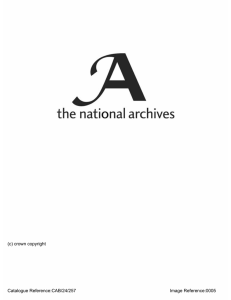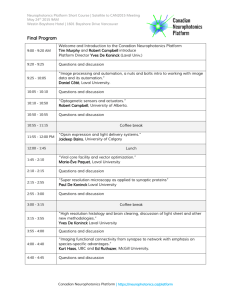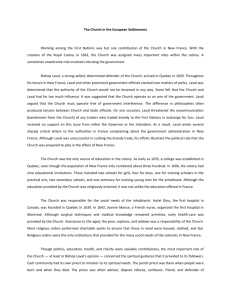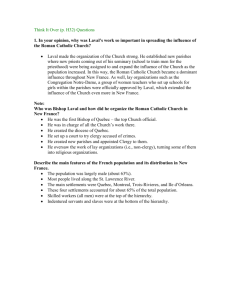(c) crown copyright Catalogue Reference:CAB/24/257 Image Reference:0004
advertisement
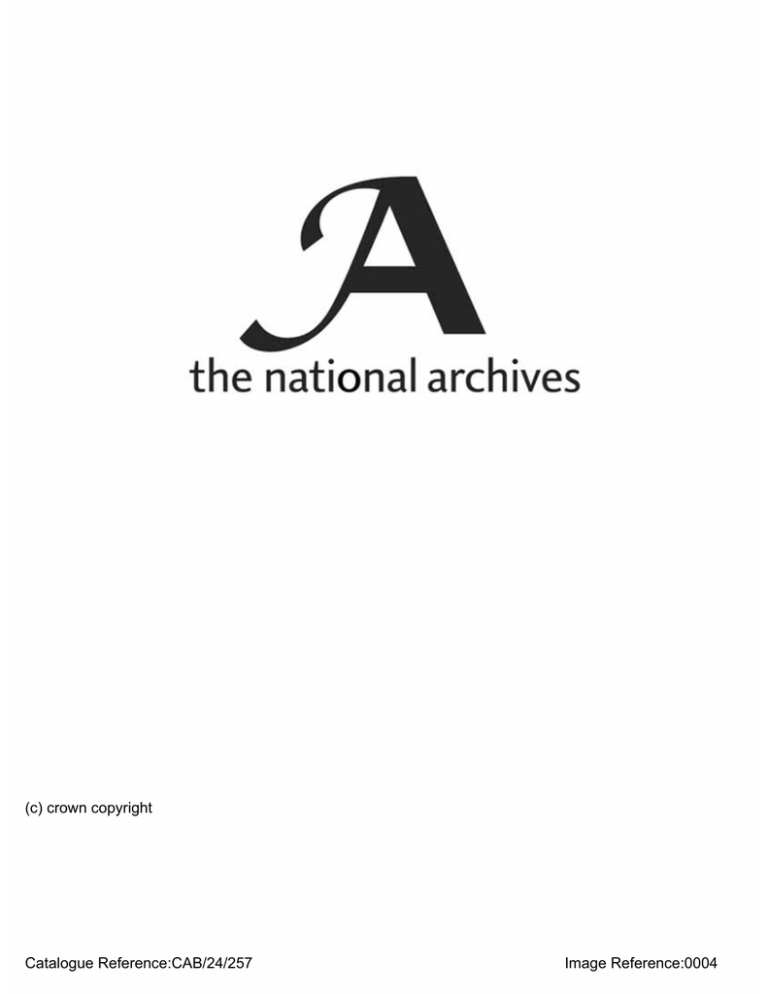
(c) crown copyright Catalogue Reference:CAB/24/257 Image Reference:0004 T H I S DOCUMENT IS T H E PROPERTY OP H I S B R I T A N N I C MAJESTY'8 GOVERNMENT Printed for the Cabinet. December 1935. Cdpy Nd* CONFIDENTIAL. CP. 233 (35). CABINET. DISPUTE BETWEEN I T A L Y AND ABYSSINIA. I C I R C U L A T E to my colleagues herewith the accompanying record of the conversation held in Paris on the 7th December between the Secretary of State for Foreign Affairs and M. Laval. A. E. December 9, 1935. THE ITALO-ETHIOPIAN DISPUTE. Record of a Meeting held at the Quai d'Or say on December at 5-30 P . M . 7, 1935, Present: GREAT BRITAIN. Sir Sir Sir Mr. Samuel Hoare. George Clerk. Robert Vansittart. Peterson. FRANCE. M. M. M. M. Pierre Laval, Leger. de Saint-Quentin. Massigli. M. L A V A L expressed pleasure at welcoming the Secretary of State in Paris. The delay in the proceedings at Geneva had been shown to be fully justified by recent political developments in France. On the question of the petrol sanction M . Laval went on to explain that France had no direct interest in the matter since she was not a supplier of petrol. But the consequences of any step which might be taken were of just as direct an interest to her as to the United Kingdom. Both from M. de Chambrun at Rome and from Signor Cerruti in Paris the French Government had every reason to know that Italy regarded the petrol sanction as a military measure although she did not wish to say so outright. N o country could exist without petrol and certainly no war could be carried on without it. I t followed that Signor Mussolini might reply to a petrol sanction by some resolution taken in a spirit of despair. Indeed M. Laval himself was convinced that this would happen. M . Laval recalled that before the war in Abyssinia had actually broken out he had expressed the wish that the embargo on Italian exports could be postponed until the processes of conciliation had failed. I n the end, and since he had himself been forced to admit that the moment was not ripe for conciliation, he had given way to the British thesis as advanced by Mr. Eden. But now, and with regard to petrol, he wished to return to the idea of seeking conciliation first before reverting to the petrol embargo. From this point of view he would deplore even-f the fixing of a relatively remote date for the entry of petrol sanctions into force, although the French, being uninterested in the supply of oil, could not oppose the embargo. I t was not necessary to abandon the idea, but negotiations^ should first be tried. Meanwhile, the formula that the petrol embargo must be generally accepted would serve to secure delay. The United States could do­ nothing effective until Congress met, which M. Laval thought would not be before: the 6th January, even i f they could do it then. B231 [124.45] ' 2 i; On the question of a common military front, M . Laval stated that, after his interview with His Majesty's Ambassador, he had seen Signor Cerruti. H e had warned him that Rome must not make a mistake in judging the French attitude; and he confirmed this through the French Ambassador in Rome. H e regretted only the allusions to this delicate process which had appeared in certain organs of the British press. H e hope that all possible restraint might be placed upon the appearance of untimely and provocative newspaper articles. S I R S A M U E L H O A R E expressed gratitude for the opportunity of conver­ sations in Paris. Mutual frankness, if doubts on both sides were to be eliminated, was essential. H e was particularly grateful for the action taken vis-a-vis of Italy, but he proposed to carry further the exploration of certain doubts which still lingered and which he should like to clear up. A " mad dog " act by Italy seemed improbable, and he had noted that both Signor Mussolini and the official press service in Rome had implied, contrary to the impression which M. Laval had received from M. de Chambrun and Signor Cerruti, that the petrol sanction would be regarded as an economic measure and not as a hostile act. But an outbreak by Italy was not out of the question, and if it were to occur it would infallibly be directed against the British Fleet or against Egypt. While this was so there were many people, particularly Italians, including Italian repre­ sentatives in most of the capitals of Europe, who were saying that, in spite of her assurances, France would not be able, or would not be in a position to give military assistance in case of necessity. He wished M. Laval to speak quite frankly and to communicate any doubts which he might have as to the possibility o f France being unable, if and when it came to the point, to give the assistance which she had undertaken to give. I t was much better to know beforehand that for one reason or another France might not be in a position to fulfil her engagements. No criticism was implied by the question, nor was it in any way intended that British policy towards Italy should be more provocative merely because Britain had reason to feel sure of French support. M. L A V A L did not attach much importance to anything the Italians might say. But as regards possible doubts as to the ability of the French Government to fulfil their engagements, he could say that it was quite clear that the policj of sanctions did not command universal approval in France. A section of French public opinion persisted in thinking that Great Britaiifs attitude towards Italy was largely determined by a dislike of Fascism. But when all was said and done France did not break her engagements, and it was precisely for this reason that she regarded herself as equally interested with us on the question of the petrol sanction. The French people habitually observed their obligations, but they must feel that everything possible was being done to find a way out of the present crisis: otherwise some would persist in thinking that the lack of consideration evinced in British policy towards Italy was in part responsible for the situation. France would do what she had promised, but to enable her to do so she must be on a footing of complete equality with the United Kingdom. M. Laval went on to explain that through the Veterans' Leagues of Italy and France he had new confirmation which he could not disregard that the petrol embargo meant war and that France must help forward a solution which would not humiliate Italy. From the same sources it had been emphasised to him that the return of the Italian troops to their country without glory or territorial acquisitions meant revolution and rather than that that Italy would fight. M. de Chambrun had reported that Signor Suvich did not wish to put forward new proposals for a settlement, but he had replied by urging the need for negotiations and he had invited Signor Cerruti urgently to induce his Government to furnish new proposals. No reply had, however, so far been forth­ coming from Signor Mussolini, whose speech of to-day M. Laval was inclined to judge rather unfavourably. But it was precisely on account of France's engagements towards us and her determination to honour them that he wished to persuade the United Kingdom to do everything possible to ward off what would be a dangerous adventure. r S I R S A M U E L H O A R E said that the petrol sanction would undoubtedly increase the danger of a " mad d o g ' ' act. H e agreed with M. Laval that negotiations must be pressed on. But if the'petrol embargo were to be postponed there must be good hope of these negotiations proving successful and to this end and as a beginning it was necessary to convince Italy that France and" Great Britain, as well as the other Powers involved, were more united than ever before. Without publicity or threats the talks between Naval Staffs ought to be carried further and supplemented by similar conversations by the A i r Staffs and the General Staffs. S I R R O B E R T V A N S I T T A R T emphasised the need for carrying on all three processes simultaneously—the fixing of the date for the embargo, the peace negotiations and the Staff conversations. H e urged that these last conversations ought to be begun at once, in fact at the beginning of next week. M. L A V A L agreed. S I R S A M U E L H O A R E said that Geneva was unlikely to agree to the embargo date being postponed unless Signor Mussolini was known to be talking seriously. The embargo itself was, he thought, originally a French proposal: no single Power seemed to be against it and in England it was felt that it was no reason for postponing a sanction because it seemed likely to be effective. H e must once more urge the importance of beginning the conversations, between the various Staffs. M. L A V A L agreed to the naval conversations being enlarged so as to include­ all the defence services. The suggestion of such an expansion had, indeed, originally been a French one. H e agreed with Sir Samuel Hoare that advantage should be taken of the presence of the French Admirals in London for the Naval Conference : he also agreed that the British Service Attaches in Paris might require assistance for the development of the conversations. H e would have no objection to their being reinforced from London for this purpose. S I R S A M U E L H O A R E explained that the British Naval Staff were anxious to see certain essential preparations made by France in the Mediterranean area. Turning to the question of the peace conversations he enquired what M. Laval would consider the best procedure to be adopted at Geneva on the supposition that the conversations with Italy had begun satisfactorily. I t was essential to avoid any impression that the League of Nations was weakening. M. L A V A L agreed. But he emphasised that Geneva would accept whatever France and Great Britain approved. I f there were to be an exception it would no doubt be Moscow. A s regards peace conditions, the Italian pretensions were excessive, but the British reservations were too severe. Mussolini must have at least a part of the territory he had conquered. Nor could he be expected to surrender to the vengeance of the Negus that part of the population which had yielded to him. T i g r e must be ceded in part. I n addition Italy wanted regions in which to settle her colonists south of the 8th parallel and excluding Ogaden, which was of no value for the purpose; on the other hand, he was fully prepared to see the Negus, afforded access to the sea. Great Britain's ideas had hitherto been unduly restricted : he appealed to her to be more generous. I t was the substance that mattered and the question of procedure was really of small importance. S I R S A M U E L H O A R E emphasised that it was essential not to offer the appearance of rewarding aggression. A s he saw it the main principles to be kept in view were the following : — (1) The proposals must be kept within the framework of the report of the Committee of Five. Abyssinia must have a definite outlet to the sea. (2) A n y question of mandate must be excluded. (3) The arrangement must be a judicious mixture of an exchange of territory and the conferring of economic concessions. The cession of territory by Ethiopia in the north must depend for its extent upon what was done in the south and south-west. A s to Tigre, he was prepared to agree that Italy must retain Adoua and Adigrat. But to go too far would lead to the Emperor's overthrow and provoke the accusation, that all the League had managed to do was to ruin Abyssinia. - In the south there must be an exchange of territory against the port which' Abyssinia was to receive; in the south-west the best way to deal with the question seemed to him to be an economic monopoly for Italy. ­ S I R R O B E R T V A N S I T T A R T said that, above everything, there must be joint Franco-British proposals. There must be no question of mediation in the sense that France put up British proposals to Italy and Italian proposals to Great Britain. A n d it was essential to remember that there must be some limit set to what Abyssinia could be expected to cede even in return for a port; to exceed this limit would be to expose the League itself to the gravest danger. M. L A V A L accepted the application of the principles laid down by the Committee of Five. But an international mandate over Abyssinia, in the form of the Plan of Assistance, did not interest Mussolini. A f t e r some further discussions it was agreed that the Secretary of State should remain in Paris for another day so that the conversations could be resumed at 1 0 - 3 0 on the 8th December. o

